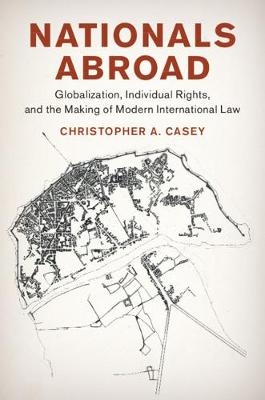
Nationals Abroad
Globalization, Individual Rights, and the Making of Modern International Law
Seiten
2020
Cambridge University Press (Verlag)
978-1-108-48945-4 (ISBN)
Cambridge University Press (Verlag)
978-1-108-48945-4 (ISBN)
A broad-ranging and ambitious study of the changing relationships between countries and their nationals abroad, and the impact that mass migration played in shaping modern international law and politics.
It is a fundamental term of the social contract that people trade allegiance for protection. In the nineteenth century, as millions of people made their way around the world, they entangled the world in web of allegiance that had enormous political consequences. Nationality was increasingly difficult to define. Just who was a national in a world where millions lived well beyond the borders of their sovereign state? As the nineteenth century gave way to the twentieth, jurists and policymakers began to think of ways to cut the web of obligation that had enabled world politics. They proposed to modernize international law to include subjects other than the state. Many of these experiments failed. But, by the mid-twentieth century, an international legal system predicated upon absolute universality and operated by intergovernmental organizations came to the fore. Under this system, individuals gradually became subjects of international law outside of their personal citizenship, culminating with the establishment of international courts of human rights after the Second World War.
It is a fundamental term of the social contract that people trade allegiance for protection. In the nineteenth century, as millions of people made their way around the world, they entangled the world in web of allegiance that had enormous political consequences. Nationality was increasingly difficult to define. Just who was a national in a world where millions lived well beyond the borders of their sovereign state? As the nineteenth century gave way to the twentieth, jurists and policymakers began to think of ways to cut the web of obligation that had enabled world politics. They proposed to modernize international law to include subjects other than the state. Many of these experiments failed. But, by the mid-twentieth century, an international legal system predicated upon absolute universality and operated by intergovernmental organizations came to the fore. Under this system, individuals gradually became subjects of international law outside of their personal citizenship, culminating with the establishment of international courts of human rights after the Second World War.
Christopher A. Casey received his BA, MA, PhD, and JD at the University of California, Berkeley.
Introduction; Part I .Mise en scène: The International Legal World, 1850-–1914: 1. The Walls of Gilgamesh; 2. Making Nations, Breaking Nationality; Part II. Mise en scène: The International Legal World, 1919-–1939: 3. Sovereign Nations; 4. Sovereign Persons; 5. Sovereign Commerce; Part III. Mise en scène: The International Legal World, 1945-–Present: 6. Cosmopolitans and Capitalists; Conclusion
| Erscheinungsdatum | 06.07.2020 |
|---|---|
| Reihe/Serie | Human Rights in History |
| Zusatzinfo | Worked examples or Exercises |
| Verlagsort | Cambridge |
| Sprache | englisch |
| Maße | 159 x 235 mm |
| Gewicht | 560 g |
| Themenwelt | Geisteswissenschaften ► Geschichte ► Allgemeine Geschichte |
| Geschichte ► Teilgebiete der Geschichte ► Militärgeschichte | |
| Recht / Steuern ► Rechtsgeschichte | |
| Sozialwissenschaften ► Politik / Verwaltung | |
| ISBN-10 | 1-108-48945-1 / 1108489451 |
| ISBN-13 | 978-1-108-48945-4 / 9781108489454 |
| Zustand | Neuware |
| Haben Sie eine Frage zum Produkt? |
Mehr entdecken
aus dem Bereich
aus dem Bereich
neueste Manipulationstechniken als Waffengattung der NATO
Buch | Softcover (2023)
Westend (Verlag)
24,00 €
Deutschlands Schwäche in der Zeitenwende
Buch | Softcover (2023)
C.H.Beck (Verlag)
18,00 €


